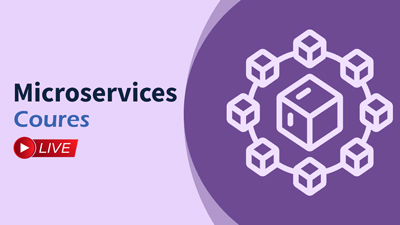 Live Classes
Live Classes
Microservices Course
4.9 (24922 Reviews)Microservices architecture is a software development approach that structures applications as a collection of small, independently deployable services, each focused on a specific business capability. Unlike traditional monolithic architectures, where the entire application is built as a single unit, microservices break down complex systems into smaller, loosely coupled services that communicate via APIs.
Learn More →
Buy Courses
Upcoming Batch Details.
Duration
- (Mon - Sat) 5 Months
- (Mon - Sat) 5 Months
- (Mon - Sat) 5 Months
- (Mon - Sat) 5 Months
- (Mon - Sat) 5 Months
Timings
- 9:00 AM to 10:00 AM
- 10:00 AM to 11:00 AM
- 4:00 PM to 5:00 PM
- 5:00 PM to 6:00 PM
- 6:00 PM to 7:00 PM
Course Fees
Get 50% off
Exciting Offer till 06 Nov
Find Course Fees →No Cost EMI options available
Overview of Our Microservices Course
The core principle of microservices is to create highly maintainable and scalable systems by dividing functionalities into smaller, manageable components. Each microservice operates as an autonomous unit with its own distinct functionality and data storage, allowing teams to develop, deploy, and scale individual services independently.
Microservices promote flexibility, agility, and faster development cycles. Teams can use different programming languages, technologies, and databases suited to specific services, enabling them to choose the most appropriate tools for each component. This modularity facilitates easier maintenance, updates, and enhancements, as changes in one service have minimal impact on others.
These services communicate through well-defined APIs, facilitating seamless interaction between different components. This approach allows for better fault isolation — if one microservice encounters an issue, it doesn't necessarily disrupt the entire system, as other services can continue to function independently.

Curriculum of Microservices Course
Well-structured & comprehensive curriculum designed according to latest trends and industry standards!
- Overview of Microservices
- Definition and characteristics.
- Contrasting monolithic and microservices architectures.
- Benefits and Challenges
- Scalability, flexibility, and maintainability.
- Challenges such as data consistency, communication overhead.
- Microservices Architecture Patterns
- Decomposition strategies: Domain-Driven Design (DDD), Bounded Contexts.
- API Gateway, Service Discovery, Load Balancing.
- Single Responsibility Principle (SRP)
- Applying SRP to microservices.
- Decentralized Data Management
- Database per service, eventual consistency.
- Data partitioning and sharding.
- Communication between Microservices
- Synchronous vs. asynchronous communication.
- RESTful APIs, Message Brokers (e.g., RabbitMQ, Kafka).
- Containerization and Orchestration
- Docker basics.
- Orchestration tools like Kubernetes.
- Choosing a Technology Stack
- Programming languages (Java, Python, Node.js, etc.).
- Frameworks (Spring Boot, Flask, Express).
- Service Development and Deployment
- Building a simple microservice.
- Deploying microservices locally and in the cloud.
- Service Registration and Discovery
- Implementing service discovery with tools like Eureka or Consul.
- API Gateways
- Role and implementation of API gateways.
- Configuring and securing API gateways.
- Database Options
- Database per service.
- Polyglot persistence.
- Event Sourcing and CQRS
- Event-driven architecture
- Command Query Responsibility Segregation (CQRS).
- Testing Strategies
- Unit testing, integration testing, end-to-end testing.
- Mocking and stubbing services.
- Consumer-Driven Contracts (CDC)
- Implementing CDC for ensuring compatibility.
- Continuous Integration in Microservices
- Setting up CI pipelines.
- Automated testing.
- Continuous Deployment with Docker and Kubernetes
- Deploying microservices to Kubernetes clusters.
- Blue-green deployments.
- Monitoring Microservices
- Instrumenting microservices.
- Metrics and health checks.
- Logging Strategies
- Centralized logging.
- Log aggregation tools.
- Authentication and Authorization
- OAuth, JWT.
- Role-based access control.
- Securing Communication
- TLS/SSL for securing communication.
- Service mesh for security.
- Scalability and Load Balancing
- Horizontal scaling.
- Load balancing strategies.
- High Availability
- Strategies for ensuring high availability.
- Fault tolerance and resilience.
- DevOps Culture
- Collaboration between development and operations.
- Automation of processes.
- Infrastructure as Code (IaC)
- Tools like Terraform or Ansible.
- Managing infrastructure in a version-controlled manner
- Case Studies
- Examining microservices architectures in real-world applications.
- Learning from successful implementations.
- Best Practices and Anti-patterns
- Common pitfalls and how to avoid them.
- Best practices for designing, developing, and maintaining microservices.
- Serverless Architectures
- Introduction to serverless.
- Use cases and challenges.
- Edge Computing
- Pushing computation closer to the data source.
- Microservices at the edge.
Why Choose Codelearn.academy ?

Training by Pro Web Developers
In this course, you will get complete training and practice sessions from a professional and expert website developer who has 10+ years of experience in the field.

Most Comprehensive Curriculum
We offer the most detailed training, covering all aspects of web development in-depth. You learn both static and dynamic website development.

Intensive Classroom Training
To offer you the best learning experience, our classrooms are fully digitized, distraction-free, and provide 1:1 personal interaction with the mentor.

Hands-on 12 Live Projects
Web development is a skill that requires immense practice. For that, you will work on a total of 12 projects (both dynamic and static websites).

Job Assistance
We prepare you for the web development interview, and arrange your interviews with top companies so that you can kickstart your career instantly after the course.

Web Development Certification
Once your training is over, you get a professional certificate that you can add to your resume and easily explore promising career opportunities.
